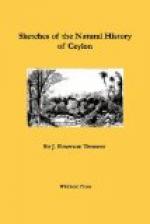CHAP. II
THE ELEPHANT
* * * * *
Its Structure.
Vast numbers in Ceylon
Derivation of the word “elephant” (note)
Antiquity of the trade in elephants
Numbers now diminishing
Mischief done by them to crops
Ivory scarce in Ceylon
Conjectures as to the absence of tusks
Elephant a harmless animal
Alleged antipathies to other animals
Fights with each other
The foot its chief weapon
Use of the tusks in a wild state doubtful
Anecdote of sagacity in an elephant at Kandy
Difference between African and Indian species
Native ideas of perfection in an elephant
Blotches on the skin
White elephants not unknown in Ceylon
CHAP. III.
THE ELEPHANT
* * * * *
Its Habits.
Water, but not heat, essential to elephants
Sight limited
Smell acute
Caution
Hearing, good
Cries of the elephant
Trumpeting
Booming noise
Height, exaggerated
Facility of stealthy motion
Ancient delusion as to the joints of the leg
Its exposure by Sir Thos. Browne
Its perpetuation by poets and others
Position of the elephant in sleep
An elephant killed on its feet
Mode of lying down
Its gait a shuffle
Power of climbing mountains
Facilitated by the joint of the knee
Mode of descending declivities
A “herd” is a family
Attachment to their young
Suckled indifferently by the females
A “rogue” elephant
Their cunning and vice
Injuries done by them
The leader of a herd a tusker
Bathing and nocturnal gambols, description of a scene by Major Skinner
Method of swimming
Internal anatomy imperfectly known
Faculty of storing water
Peculiarity of the stomach
The food of the elephant
Sagacity in search of it
Unexplained dread of fences
Its spirit of inquisitiveness
Anecdotes illustrative of its curiosity
Estimate of sagacity
Singular conduct of a herd during thunder
An elephant feigning death
Appendix.—Narratives of natives,
as to encounters with rogue
elephants
CHAP. IV.
THE ELEPHANT
* * * * *
Elephant Shooting.
Vast numbers shot in Ceylon




